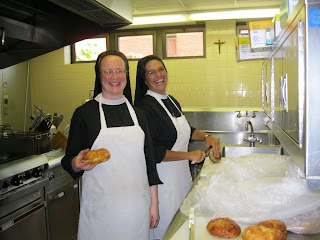 |
| St. Anthony of Egypt |
In the early Church, again just after the age of the martyrs, there appeared another trend: the desert hermits. Men, generally, although not exclusively, who desired to live wholly for Christ - and to get away from the distraction of the world - went into the desert to live a life of extreme austerity and prayer. Living chastely and poorly, they gave themselves up to the service of the Gospel. And became saints.
It always happened - it still does. The holy man, the holy woman, attracts people. They see the profound beauty of a holy life and "want some of that." So, the desert hermits had a very difficult time staying hermits. Others came out to ask the holy man to direct them, to teach them how to come to God.
(If you want a modern example, look at the phenomenon of Mother Teresa of Calcutta. Same thing.)
So these holy ones began to direct others in their lives. Thus did the vow of obedience have its earliest beginnings. The desire to come to God led a man or a woman to say, "I'll do anything you say - just help me become a saint." They would bind themselves to follow the holy person in order to attain God's will.
Over time, this too stabilized. The Church blessed it, directed it, made it firm. The vow of obedience has as it's immediate end the overwhelming desire to do God's will. It is the desire to be a saint - and the knowledge that I am really good at rationalizing. I am an expert at looking at what I want and canonizing it. Rather than that, I choose to do the will of another. That other has been elected and is directed by all kinds of safeguards. I can know that by doing something ordered in "Holy Obedience," I do the will of God. He is ever faithful and accepts my vow. He will use it to make me the saint he calls me to be.
Can't ask for more than that.


























